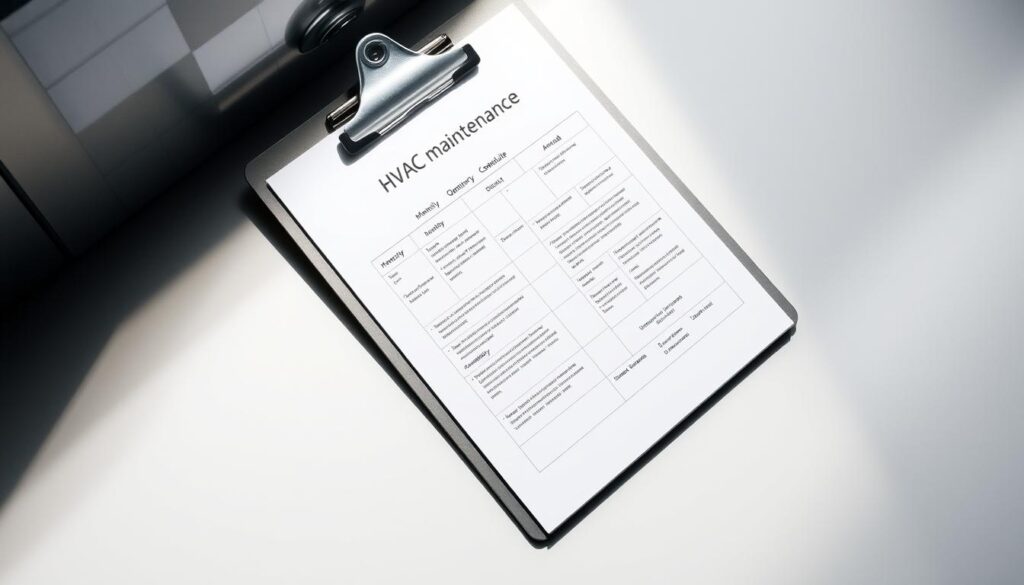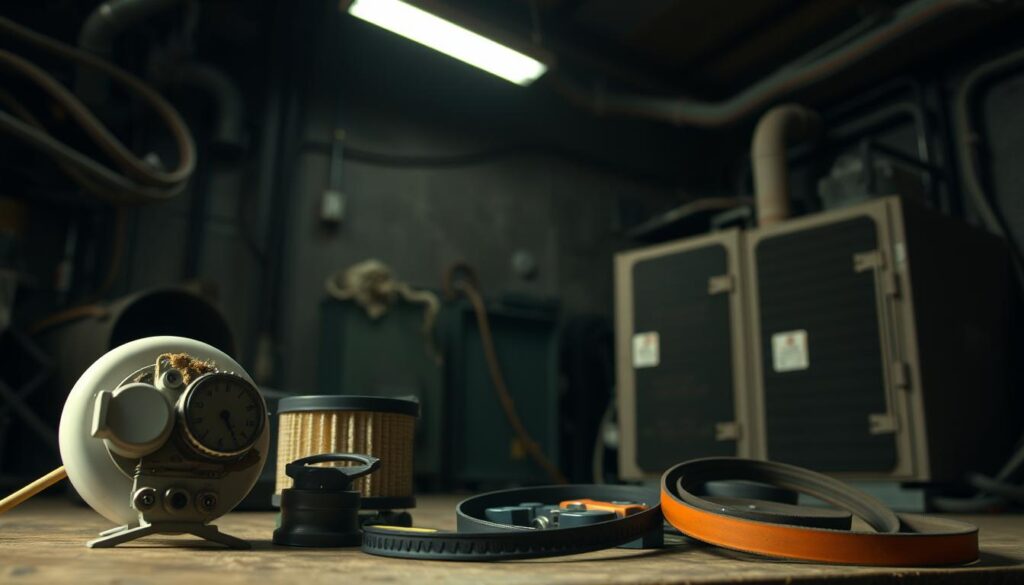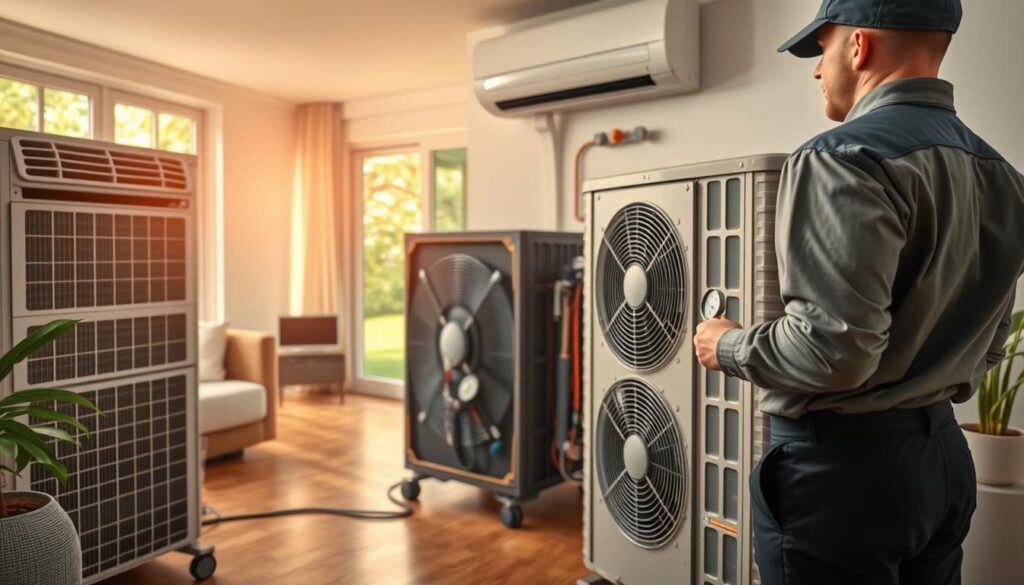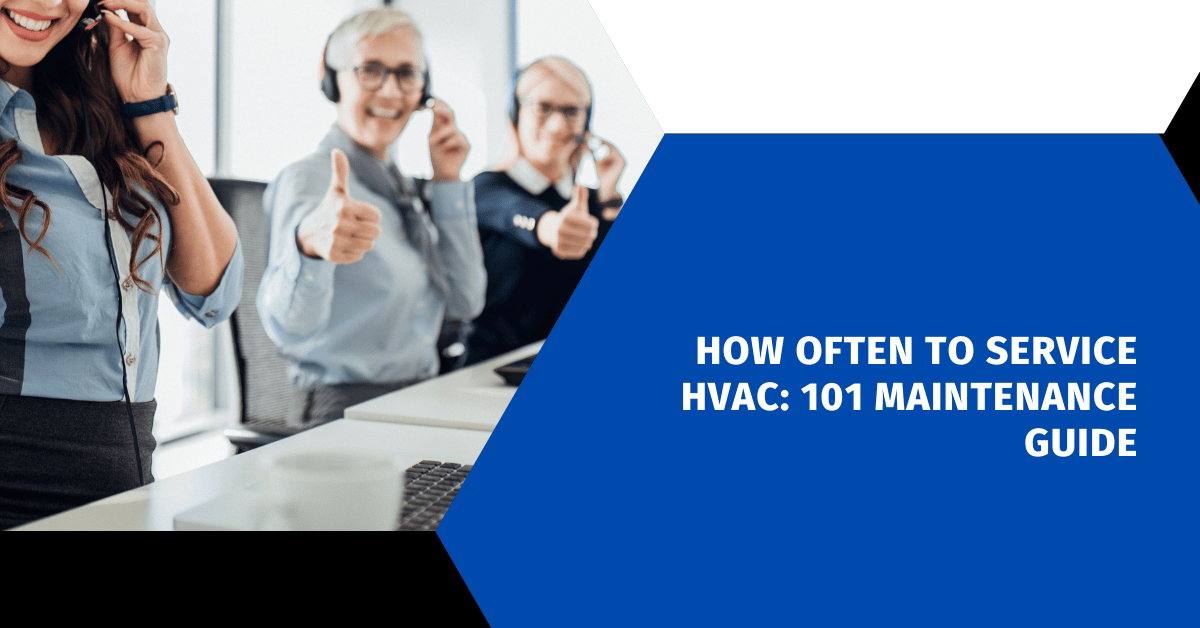Affiliate Disclosure
HVAC Guide Guys is a participant in the Amazon Services LLC Associates Program, an affiliate advertising program designed to provide a means for sites to earn advertising fees by advertising and linking to Amazon.
How Often to Service HVAC? Do you know that ignoring your HVAC system’s maintenance can shorten its life? Many homeowners don’t realize how vital regular upkeep is. It keeps your heating and cooling systems working well.

Knowing when to service your HVAC can save you a lot of money and avoid sudden failures. Experts say to get your system checked twice a year. This is best done in spring and fall to handle the extreme temperatures.
Keeping your home comfortable and energy-efficient starts with maintenance. Spending a little time and money on upkeep can make your equipment last longer. It also cuts down on energy bills and keeps your home cozy all year.
Key Takeaways
- Schedule professional HVAC maintenance twice per year
- Ideal service times are before summer and winter seasons
- Regular maintenance prevents costly unexpected repairs
- Professional inspections improve system efficiency
- Routine care extends your HVAC system’s operational lifespan
Table of Contents
Understanding HVAC System Maintenance Basics
Your HVAC system is made up of many parts that work together to keep your home comfy. It’s important to get regular maintenance to keep it working well. Knowing the basics of HVAC maintenance helps protect your investment and keeps your home comfortable.
Proper maintenance is more than just occasional visits. It’s about taking care of your heating and cooling system in many ways.
What Does HVAC Maintenance Include
A typical HVAC maintenance visit includes several key tasks:
- Comprehensive system inspection
- Cleaning of essential components
- Checking and replacing air filters
- Lubricating moving parts
- Testing electrical connections
Why Regular Maintenance Matters
Regular maintenance offers many benefits for your HVAC system:
| Benefit | Impact |
|---|---|
| Energy Efficiency | Reduces energy consumption by up to 15% |
| System Longevity | Extends equipment life by 5-10 years |
| Performance | Maintains peak operating capacity |
Key Components Requiring Service
Important HVAC components that need regular care include:
- Compressor: The heart of your cooling system
- Condenser coils: Responsible for heat transfer
- Air filters: Crucial for air quality and system efficiency
- Thermostat: Ensures accurate temperature control
By knowing these maintenance basics, you can take steps to keep your HVAC system running smoothly and efficiently.
Explore Our HVAC Shop
Looking for top-rated HVAC tools, parts, and accessories? Visit our shop and find the perfect solution for your needs.
Visit the ShopHow Often to Service HVAC: Professional Recommendations
Experts say your HVAC system needs regular care to work its best. This care stops sudden breakdowns and keeps it running smoothly.
When to get your HVAC checked is key. Most pros say you should get it serviced at least twice a year. Do this in spring and fall to get your system ready for hot summers and cold winters.
- Spring maintenance focuses on air conditioning readiness
- Fall maintenance prepares heating systems for cold weather
- Comprehensive hvac equipment upkeep helps prevent costly repairs
Several things affect how often you need to service your HVAC. The age of your system, how much you use it, and your local weather are all important.
| System Age | Recommended Annual Inspections |
|---|---|
| New Systems (0-5 years) | 1-2 times per year |
| Mature Systems (5-10 years) | 2 times per year |
| Older Systems (10+ years) | 2-3 times per year |
Regular maintenance can make your HVAC last longer, save energy, and cut down on repair costs. Book a professional hvac unit inspection with a certified tech to keep your system in top shape.
Seasonal Maintenance Timeline for Peak Performance
Keeping your HVAC system in top shape all year is key. It ensures your system works well, saves energy, and lasts longer. A good maintenance plan helps avoid sudden breakdowns and expensive fixes.
For a great HVAC tune-up, you need a detailed plan. It should cover different needs at various times. A structured maintenance plan keeps your system efficient and reliable.
Spring Maintenance Checklist
Spring is the time to get your cooling system ready for warmer weather. Here are the must-do tasks:
- Clean or replace air filters
- Inspect and clean condenser coils
- Check refrigerant levels
- Test thermostat functionality
- Clear debris around outdoor units
Fall Preparation Tasks
Before the cold hits, make sure your heating system is ready. Here’s what to do:
- Inspect furnace components
- Clean and lubricate moving parts
- Check heat exchanger for cracks
- Test carbon monoxide levels
- Seal and insulate ductwork
Year-round Monitoring Tips
Regular checks on your HVAC system can prevent big problems and make it last longer:
| Monthly Tasks | Quarterly Checks |
|---|---|
| Change air filters | Inspect electrical connections |
| Clean air vents | Check thermostat calibration |
| Listen for unusual noises | Examine refrigerant levels |
Pro tip: Get a professional to do your HVAC maintenance twice a year. This catches problems early and keeps your system efficient.
Explore Our HVAC Shop
Looking for top-rated HVAC tools, parts, and accessories? Visit our shop and find the perfect solution for your needs.
Visit the ShopEssential DIY HVAC Maintenance Tasks
Keeping your HVAC system in good shape doesn’t always need a pro. You can do many simple tasks at home to keep it running well. Learning about basic upkeep can save you money and avoid big problems.
Regular care is key to keeping your HVAC system efficient and lasting longer. Here are some DIY tasks every homeowner should know:
- Replace air filters every 1-3 months
- Clean outdoor unit from debris and vegetation
- Check thermostat battery and settings
- Inspect air vents for blockages
- Clean air registers and return vents
Some specific maintenance techniques can really boost your system’s performance:
| Task | Frequency | Difficulty Level |
|---|---|---|
| Air Filter Replacement | Every 90 days | Easy |
| Outdoor Unit Cleaning | Seasonal | Moderate |
| Thermostat Calibration | Annually | Easy |
Pro tip: Always turn off power to your HVAC system before performing any maintenance tasks to ensure your safety.
While DIY tasks are vital, some complex maintenance should be done by certified HVAC pros. They can do detailed system checks and fix issues that you might miss.
Professional Service Components and Inspections
Getting a professional HVAC unit inspection is a smart move for your heating and cooling system’s health. Experts offer more than just maintenance. They provide detailed services that keep your equipment in top shape and running smoothly.
Professional HVAC servicing includes many important steps. Trained techs do thorough checks to spot issues early and avoid costly repairs.
Comprehensive System Check
During an inspection, techs check your HVAC system’s main parts:
- Electrical connection testing
- Refrigerant level assessment
- Airflow measurement
- Thermostat calibration
Technical Maintenance Procedures
HVAC maintenance needs special skills and care. Techs will:
- Clean internal parts
- Lubricate moving parts
- Replace old parts
- Adjust and align system parts
| Service Component | Purpose | Frequency |
|---|---|---|
| Electrical Connection Check | Prevent system failures | Annually |
| Motor Lubrication | Reduce wear and tear | Bi-annually |
| Refrigerant Level Inspection | Keep system efficient | Annually |
Safety Inspections and Testing
Safety is key during HVAC servicing. Experts do thorough tests to make sure your system is safe:
“Regular professional inspections can prevent hazards and extend your HVAC system’s life.” – HVAC Industry Expert
- Carbon monoxide leak detection
- Electrical safety check
- Ventilation system check
- Combustion efficiency test
Investing in professional HVAC unit inspection protects your equipment, ensures safety, and keeps your system running at its best.
Explore Our HVAC Shop
Looking for top-rated HVAC tools, parts, and accessories? Visit our shop and find the perfect solution for your needs.
Visit the ShopSigns Your HVAC Needs Immediate Service

Spotting early signs of HVAC problems can prevent expensive fixes and sudden failures. Regular HVAC service is vital for keeping your system running smoothly. Knowing when to call a pro is essential for good maintenance.
Look out for these important warning signs that mean your HVAC needs help right away:
- Unusual Noises: Grinding, squealing, or banging sounds mean there’s a mechanical problem
- Inconsistent Temperatures: If rooms are not cooling or heating evenly
- Sudden jumps in energy bills without changing how you use it
- Water leaks around your HVAC unit
- Weak or no airflow from vents
- System constantly cycling on and off
Ignoring these signs can cause serious damage to your system. If you see any of these, call an HVAC expert right away. Quick action during regular service can stop small problems from becoming big, costly issues.
Be extra careful during the hottest summer and coldest winter months. Your HVAC system works its hardest then. So, it’s key to fix any issues fast.
“Early detection is the best prevention in HVAC maintenance.”
Cost Benefits of Regular HVAC Maintenance
Getting your HVAC system checked every year is more than just upkeep. It’s a smart move that can save you a lot of money. Regular maintenance stops expensive breakdowns and keeps your system running smoothly.
Knowing the money-saving perks of regular maintenance helps you make better choices for your home’s comfort systems.
Long-term Savings Analysis
Regular HVAC maintenance saves a lot of money. By getting routine check-ups, you can avoid costly emergency repairs and early system replacements.
- Preventive maintenance can reduce repair costs by up to 95%
- Annual service can extend system lifespan by 5-10 years
- Regular tune-ups minimize unexpected breakdown expenses
Energy Efficiency Improvements
A well-kept HVAC system uses less energy, which means lower bills. Clean filters and well-tuned components lead to better performance and lower energy costs.
| Maintenance Frequency | Energy Savings | Annual Cost Reduction |
|---|---|---|
| Quarterly Checkups | 10-15% | $180-$270 |
| Bi-Annual Service | 15-20% | $270-$360 |
| Annual Professional Maintenance | 5-10% | $90-$180 |
Prevention vs. Repair Costs
It’s clear: regular maintenance is cheaper than waiting for breakdowns. Proactive care prevents expensive emergency repairs and helps you plan your budget better.
- Average maintenance cost: $100-$300 annually
- Average emergency repair cost: $500-$2,000
- Potential system replacement cost: $5,000-$10,000
By focusing on HVAC annual service, you protect your investment and keep your home comfortable without overspending.
Explore Our HVAC Shop
Looking for top-rated HVAC tools, parts, and accessories? Visit our shop and find the perfect solution for your needs.
Visit the ShopExtending Your HVAC System’s Lifespan

Your HVAC system is a big investment in your home’s comfort. By doing regular hvac preventive maintenance, you can make it last longer than usual. This means it can work well for 15-25 years or more. Smart homeowners know that taking care of it early on is the best way to keep it running smoothly and avoid expensive fixes.
Effective hvac equipment upkeep involves several critical strategies:
- Regular professional inspections every 6-12 months
- Consistent air filter replacements
- Cleaning internal and external system components
- Addressing minor issues before they escalate
Professional maintenance is key to making your system last longer. Technicians can spot problems early, which helps avoid damage to important parts. Preventative care is always more cost-effective than emergency repairs.
Here are more tips to keep your HVAC system in top shape:
- Schedule annual professional tune-ups
- Keep outdoor units clear of debris
- Monitor system performance between service visits
- Upgrade to high-efficiency components when possible
A well-maintained HVAC system can operate efficiently for decades, providing consistent comfort and significant long-term savings.
By focusing on thorough maintenance, you’ll keep your HVAC system reliable, energy-efficient, and ready for any season. This way, it will work well without much trouble.
Conclusion
Regular HVAC maintenance is key to a comfortable home and an efficient system. Knowing when to service your HVAC can save you money and avoid big repairs. Replacing an HVAC system can cost between $5,000 and $11,000.
Keep your HVAC in top shape with both professional checks and your own monitoring. Seasonal tune-ups and yearly professional inspections can make your system last longer. These steps also boost performance, air quality, and energy use.
Creating a solid HVAC maintenance plan needs dedication and planning. Working with certified pros can help craft a plan that fits your system and home. Every maintenance step you take means more savings, reliability, and comfort in the long run.
Start by booking your next HVAC service and sticking to a maintenance schedule. Your future self will thank you for the savings, better energy use, and peace of mind from a well-kept system.

